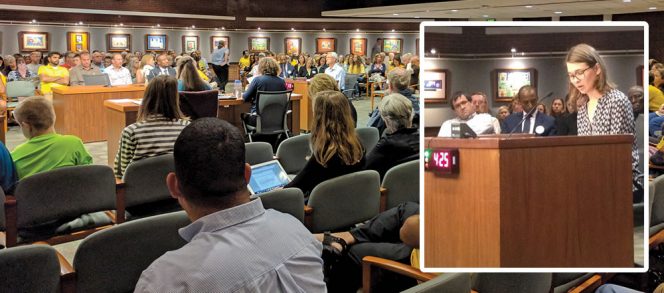Under Maryland’s composting regulations, farms that meet the state’s exemption must still comply with local zoning ordinances.
Marsha Johnston
BioCycle October 2017

Howard County public hearing on a zoning regulation amendment (ZRA) for on-farm composting included testimony in support of the ZRA by Linda Bilsens Brolis of the Institute for Local Self-Reliance (inset).
And therein lies the problem, as the Howard County Council discovered at public hearings in July and September about Zoning Regulation Amendment Bill 180 (ZRA 180). As written, ZRA 180 (aka CB60), which is designed to cover any wood mulch and composting activity, recognizes that some farm composting operations would not meet the MDE exemptions and so added conditional uses that were drafted after deliberations with county stakeholders, including the Dayton Rural Preservation Society.
“The conditional uses have more detail than the MDE regulations lay out,” explains Linda Bilsens Brolis, Composting For Community Project Manager for the Institute for Local Self-Reliance (ILSR), who attended the meeting to testify in support of the amendment. “They have applied the MDE regulations to their zoning categories, and added a section on conditional uses, which seem to have explicit parameters.” Indeed, the conditional uses, which do require MDE composting permits, include a Special Farm Use for Composting Facility for operations of up to 3 acres, and details such as restricting on-site compost sales to be picked up only by pick up trucks, farm or noncommercial vehicles.
Varying Views
Howard County’s move to add composting activities to its zoning ordinances has found opponents on both sides of the issue. Many farmers say the authorized composting operation sizes are not economically viable, while the opposition contends that ZRA 180/CB 60 has loopholes that will allow industrial-sized composters to operate in bucolic agricultural conservation zones under the guise of farming. Brolis notes that the council seemed to be in some disagreement over the existence of such loopholes.
Keith Ohlinger, owner of Heritage Hill Farm in Woodbine, who worked on the Howard County Task Force that aimed to reconcile the concerns of nonfarm residents and farmers, says the ZRA 180 opponents have misinformed other residents by saying that the zoning changes will bring in industrial composting operations that will poison their groundwater, pollute the air and choke country roads with 18-wheel trucks.
Both the July and September meetings lasted for hours to accommodate many testifiers, many of whom were clearly uninformed about the composting process. Brolis notes that July’s meeting sometimes degenerated into a yelling match, with the September meeting raising the tensions. “It’s a complex situation that’s pitting farmers who want to compost against people who either want to severely limit composting on farms, or ban it all together,” she explains. “There may be some legitimate concerns that deserve further discussion, but there’s also been significant fear-mongering, resulting in people being legitimately scared that composting and mulching will kill their children. As you can imagine, this makes it very difficult for productive discussion to take place. This is a battle that’s been many, many years in the making.”
Some of the more disturbing testimonies included one claiming to link composting/mulching to drinking water contamination and cancer, and a local Sierra Club representative expressing disbelief and disgust at animal waste being included in compost. ”Things have gotten so contentious,” adds Brolis. “I think what happens in Howard County could set a precedent for what happens in the rest of the state, maybe the country. It underscores the importance of farmers and composters being at the table as stakeholders.”
Craig Coker, a longtime composting consultant and BioCycle Senior Editor, who established two biosolids composting facilities in Maryland, agrees that modifying zoning ordinances to allow for more composting operations is increasingly difficult. “It is a problem that we keep running into all over the country,” he notes. “The vast majority of land use zoning ordinances do not have a definition of composting. In agricultural zoning, they obviously allow agricultural activity, and composters have long contended that we are doing something agricultural. But if organics are brought in from outside, you are now a commercial enterprise. Plus, we live in a society where people no longer trust government in any way shape or form. It is making getting these facilities approved much harder.”
Jeremy Criss, Director of Montgomery County’s Office of Agricultural Services, does not believe the problem Howard County is experiencing will spill over to other parts of the state. “The zoning in Howard County is designed to promote residential development over the interests of farming,” explains Criss. “Howard County is unique in that it does not have an agricultural zone that would protect the farmer.” He adds that the residents, with the highest per capita income of any county in the state, apparently want to keep it that way.
The Howard County Council is scheduled to take action on ZRA 180/CB 60 on October 2. Watch for an update at BioCycle.net.
Marsha W. Johnston is a Contributing Editor at BioCycle and an Editor at Earth Steward Associates in Arlington, VA (mwjohnston1@gmail.com).
Corrections made October 25, 2017










